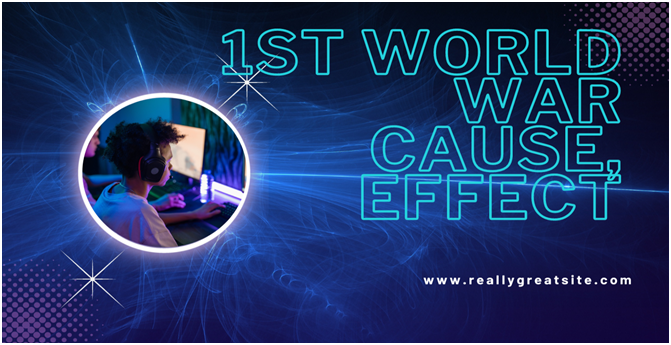1st world war cause, effect
World War I was a global conflict that lasted from 1914 to 1918,
and involved many of the world's major powers. The key events and factors that
led to the outbreak of World War I were complex and multifaceted, but some of
the major causes included:
1.
Nationalism: The belief in the superiority of one's
own country and culture had been growing in Europe for decades. Nationalistic
fervor contributed to the outbreak of the war, as many people felt a strong
sense of pride in their country and were willing to fight for it.
2.
Imperialism: European powers were competing for
control of colonies and territories around the world, leading to tensions and
rivalries between nations. The pursuit of colonies and resources also led to
alliances between countries, which further complicated the political landscape.
3.
Militarism: Many countries were building up their
military forces, which contributed to a sense of rivalry and competition
between nations. This arms race created a sense of insecurity and fear among
the major powers, and increased the likelihood of conflict.
4.
Alliances: Various countries had formed alliances
with one another, which meant that a conflict between two countries could
quickly escalate into a much larger war.
5.
Assassination of Archduke Franz Ferdinand: The
assassination of the Archduke of Austria-Hungary by a Serbian nationalist in
June 1914 was the immediate trigger that led to the outbreak of war.
The consequences of World War I were
far-reaching and profound. The war resulted in the loss of millions of lives
and left many countries in ruins. The Treaty of Versailles, which ended the
war, imposed heavy reparations on Germany, which contributed to economic
instability and political unrest in the country. The war also led to the collapse
of empires, including the Austro-Hungarian and Ottoman Empires, and contributed
to the rise of new nations and political ideologies, such as communism. The war
also paved the way for World War II, as unresolved tensions and grievances from
the first war continued to fester in Europe in the interwar years.
১ম বিশ্বযুদ্ধের কারণ, প্রভাব
প্রথম বিশ্বযুদ্ধ ছিল একটি বিশ্বব্যাপী সংঘাত যা
1914 থেকে
1918 সাল পর্যন্ত স্থায়ী হয়েছিল এবং বিশ্বের অনেক বড় শক্তি এতে জড়িত ছিল। প্রথম বিশ্বযুদ্ধের প্রাদুর্ভাবের মূল ঘটনা এবং কারণগুলি জটিল এবং বহুমুখী ছিল,
তবে কিছু প্রধান কারণ অন্তর্ভুক্ত:
জাতীয়তাবাদ:
নিজের দেশ ও সংস্কৃতির শ্রেষ্ঠত্বের বিশ্বাস ইউরোপে কয়েক দশক ধরে বেড়েই চলেছে। জাতীয়তাবাদী উচ্ছ্বাস যুদ্ধের প্রাদুর্ভাবের জন্য অবদান রেখেছিল,
কারণ অনেক লোক তাদের দেশে একটি দৃঢ় গর্ব অনুভব করেছিল এবং এর জন্য লড়াই করতে ইচ্ছুক ছিল।
সাম্রাজ্যবাদ: ইউরোপীয় শক্তিগুলি সারা বিশ্বের উপনিবেশ এবং অঞ্চলগুলির নিয়ন্ত্রণের জন্য প্রতিযোগিতা করছিল,
যার ফলে জাতিগুলির মধ্যে উত্তেজনা এবং প্রতিদ্বন্দ্বিতা দেখা দেয়। উপনিবেশ এবং সম্পদের অন্বেষণ দেশগুলির মধ্যে জোটের দিকে পরিচালিত করে,
যা রাজনৈতিক ল্যান্ডস্কেপকে আরও জটিল করে তোলে।
সামরিকতা:
অনেক দেশ তাদের সামরিক বাহিনী গড়ে তুলছিল,
যা জাতিগুলির মধ্যে প্রতিদ্বন্দ্বিতা এবং প্রতিযোগিতার অনুভূতিতে অবদান রেখেছিল। এই অস্ত্র প্রতিযোগিতা বৃহৎ শক্তিগুলোর মধ্যে নিরাপত্তাহীনতা ও ভয়ের বোধ তৈরি করে এবং সংঘাতের সম্ভাবনা বাড়িয়ে দেয়।
জোট: বিভিন্ন দেশ একে অপরের সাথে জোট গঠন করেছিল,
যার অর্থ দুই দেশের মধ্যে একটি দ্বন্দ্ব দ্রুত একটি অনেক বড় যুদ্ধে পরিণত হতে পারে।
আর্চডিউক ফ্রাঞ্জ ফার্দিনান্দের হত্যা:
1914 সালের জুন মাসে সার্বিয়ান জাতীয়তাবাদী দ্বারা অস্ট্রিয়া-হাঙ্গেরির আর্চডিউকের হত্যা ছিল তাৎক্ষণিক ট্রিগার যা যুদ্ধের সূত্রপাত ঘটায়।
প্রথম বিশ্বযুদ্ধের পরিণতি ছিল সুদূরপ্রসারী এবং গভীর। যুদ্ধের ফলে লক্ষাধিক মানুষের প্রাণহানি ঘটে এবং বহু দেশ ধ্বংসের মুখে পড়ে। ভার্সাই চুক্তি,
যা যুদ্ধের অবসান ঘটিয়েছিল,
জার্মানির উপর ভারী ক্ষতিপূরণ আরোপ করেছিল,
যা দেশে অর্থনৈতিক অস্থিতিশীলতা এবং রাজনৈতিক অস্থিরতায় অবদান রাখে। যুদ্ধটি অস্ট্রো-হাঙ্গেরিয়ান এবং অটোমান সাম্রাজ্য সহ সাম্রাজ্যের পতনের দিকে পরিচালিত করে এবং কমিউনিজমের মতো নতুন জাতি এবং রাজনৈতিক মতাদর্শের উত্থানে অবদান রাখে। যুদ্ধটি দ্বিতীয় বিশ্বযুদ্ধের পথও প্রশস্ত করেছিল,
কারণ প্রথম যুদ্ধের অমীমাংসিত উত্তেজনা এবং অভিযোগগুলি আন্তঃযুদ্ধের বছরগুলিতে ইউরোপে ক্রমাগত বৃদ্ধি পেতে থাকে।






No comments:
Post a Comment